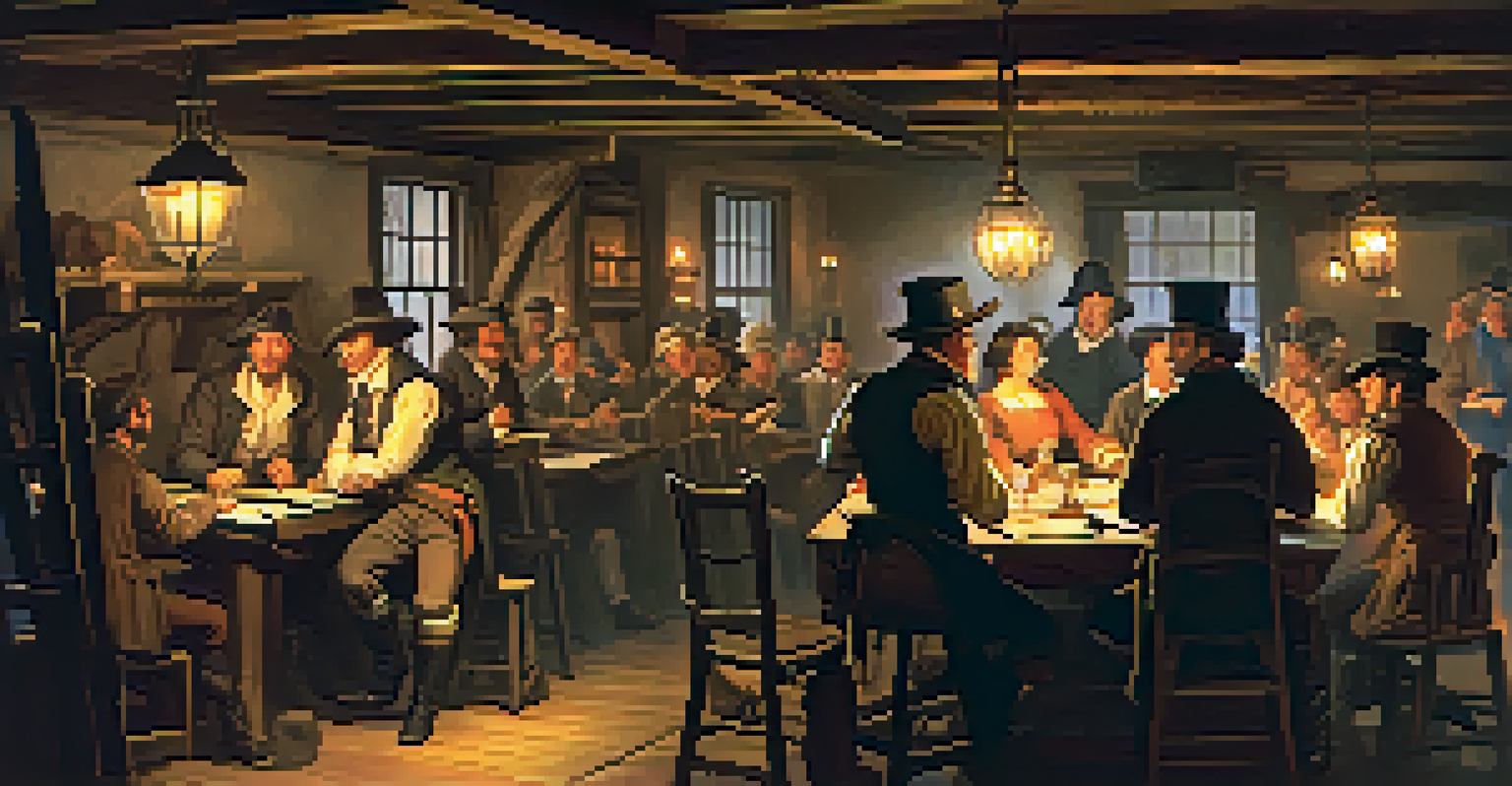Boston's Role in the American Revolution and Global Trade

Boston: The Cradle of the American Revolution
Boston is often referred to as the cradle of the American Revolution due to its significant role in the events leading up to independence. The city became a hotbed of revolutionary activity, fostering a spirit of resistance against British rule. Events such as the Boston Tea Party and the Boston Massacre ignited passions and united colonists in their quest for freedom.
No taxation without representation!
The Boston Tea Party in 1773 was a direct response to the Tea Act, which many colonists viewed as taxation without representation. Dressed as Mohawk Indians, colonists boarded British ships and dumped 342 chests of tea into Boston Harbor, a bold statement against British authority. This act of defiance not only galvanized local patriots but also inspired similar protests across the colonies.
Moreover, Boston hosted influential figures like Samuel Adams and Paul Revere, who played crucial roles in organizing resistance. Their efforts helped establish networks of communication and support, allowing revolutionary ideas to spread rapidly. The city's involvement in the revolution laid the groundwork for future democratic movements both in America and around the world.
The Boston Massacre: A Turning Point
The Boston Massacre, which occurred in March 1770, marked a critical turning point in colonial attitudes toward British rule. Tensions had been mounting between colonists and British soldiers stationed in Boston, and a confrontation escalated into violence, resulting in the deaths of five civilians. This incident fueled anti-British sentiment and became a rallying point for revolutionary fervor.

In the aftermath, Paul Revere’s famous engraving of the event depicted British soldiers mercilessly firing on innocent colonists, stirring outrage throughout the colonies. This portrayal helped to galvanize public opinion against British oppression and showcased the power of propaganda in shaping revolutionary sentiments. It transformed the narrative around British authority and highlighted the need for unity among the colonies.
Boston: Birthplace of Revolution
Boston played a crucial role in the American Revolution, serving as a hotbed for revolutionary activities and ideas.
The Boston Massacre also prompted the formation of the Committees of Correspondence, which facilitated communication between colonies. These committees played a pivotal role in organizing resistance and spreading revolutionary ideas, ultimately contributing to the establishment of a unified front against British rule. The event showcased Boston's central role in the fight for independence.
Boston as a Hub for Revolutionary Ideas
Beyond its pivotal events, Boston became a thriving hub for revolutionary ideas and discussions. The city was home to influential thinkers and writers who challenged the status quo and articulated the colonists' grievances against British rule. Pamphlets, newspapers, and public forums became the vehicles for spreading revolutionary ideas, creating a well-informed populace.
Give me liberty, or give me death!
One notable figure was Thomas Paine, whose pamphlet 'Common Sense' argued for independence and resonated deeply with colonists. His straightforward language and compelling arguments made the case for breaking away from British rule accessible to the average citizen. This work, along with others published in Boston, ignited conversations about liberty, rights, and governance across the colonies.
As debates flourished, Boston's taverns and meetinghouses became the gathering spots for revolutionaries to exchange ideas and strategize. These venues fostered a sense of community and purpose, uniting diverse groups under a common goal. Ultimately, Boston's vibrant intellectual climate helped shape the philosophy of the American Revolution.
The Role of Boston's Port in Global Trade
Boston's strategic location along the Atlantic coastline made it a crucial port for both colonial shipping and global trade. By the 18th century, the city had established itself as a bustling trade center, linking the Americas with Europe, the Caribbean, and beyond. Ships laden with goods like rum, fish, and timber sailed from Boston to various markets, contributing to the colony's economic vitality.
The town's merchants played a significant role in the triangular trade, which involved the exchange of goods between Africa, the Americas, and Europe. This commerce not only enriched Boston but also provided the resources needed to fund revolutionary efforts. The wealth generated from trade allowed for the purchase of arms and supplies, which were essential for the colonial fight against British forces.
Boston Tea Party's Impact
The Boston Tea Party was a bold act of defiance against British taxation, symbolizing the colonists' struggle for representation.
However, the increasing restrictions imposed by British trade regulations, such as the Navigation Acts, sparked resentment among Bostonians. These laws limited trade opportunities and profits, heightening tensions and leading to calls for greater autonomy. Boston's role in global trade was thus intertwined with its revolutionary spirit, as economic interests fueled the desire for independence.
The Boston Tea Party: A Bold Statement Against Taxation
The Boston Tea Party, held on December 16, 1773, was a pivotal act of rebellion against British taxation policies. Colonists, frustrated by the Tea Act that granted the British East India Company a monopoly on tea sales, sought to make a statement. By dumping an entire shipment of tea into the harbor, they aimed to demonstrate their discontent and challenge British authority.
This act was not just about tea; it symbolized the larger struggle against taxation without representation. It captivated the imaginations of colonists and became a powerful symbol of resistance. The event was a clear message to Britain that the colonists would not accept oppressive measures silently, sparking outrage and leading to further punitive measures from the Crown.
In response to the Tea Party, the British enacted the Intolerable Acts, which aimed to punish Boston for its defiance. Ironically, these acts only solidified colonial unity and resistance, leading to the formation of the First Continental Congress. The Boston Tea Party thus served as a catalyst for the revolutionary movement, cementing Boston's position as a center of dissent.
Boston's Legacy in American Independence
Boston's legacy in the American Revolution extends far beyond its historical events; it represents the spirit of independence and resilience. The city's role in the revolution was marked by a collective desire for freedom and self-determination, which resonated throughout the colonies. This legacy continues to inspire movements for liberty and justice today.
As the birthplace of key revolutionary events, Boston has become a symbol of American independence. The Freedom Trail, a walking path through the city, highlights historic sites like the Old North Church and the Massachusetts State House, allowing visitors to connect with the past. This tourism not only preserves the city's history but also educates future generations about the importance of civic engagement.
Legacy of Independence
Boston's legacy in the revolution inspires ongoing movements for liberty and justice, highlighting its significance in American history.
Moreover, Boston's commitment to education and political discourse has fostered a culture of activism and advocacy. The ideals of democracy and freedom that emerged during the revolution remain integral to the city's identity. As such, Boston stands not only as a historical landmark but as a living testament to the ongoing quest for liberty.
Boston's Influence on Global Trade Patterns
Boston's role in the American Revolution had far-reaching implications for global trade patterns. As the colonies fought for independence, they began to establish new trading relationships outside of British control. This shift not only transformed local economies but also altered the dynamics of global commerce, paving the way for a more interconnected world.
Post-revolution, Boston emerged as a key player in international trade, exporting goods like textiles and shipbuilding products. The city's merchants capitalized on their newfound freedom to trade with countries such as France and Spain, expanding their markets and influence. This not only fostered economic growth but also contributed to the development of a unique American identity in the global marketplace.

Furthermore, Boston's experiences during the revolution emphasized the importance of trade in achieving political independence. The lessons learned about self-sufficiency and alternative trading partners laid the foundation for future economic policies. Today, Boston's historical significance in trade continues to resonate, reminding us of the interconnectedness of commerce and political autonomy.